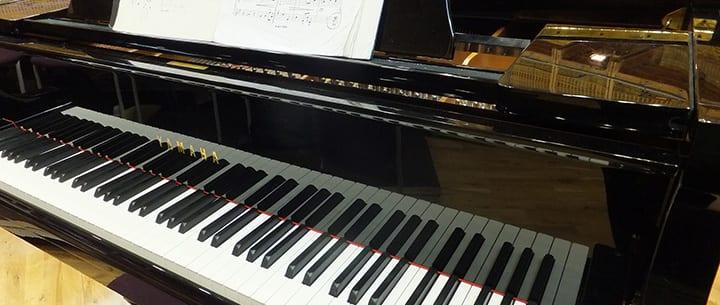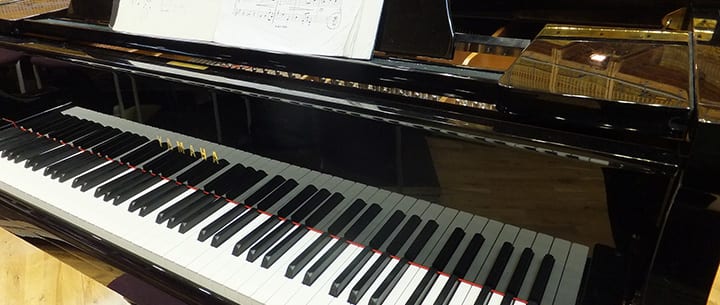From piano basics to the more advanced techniques — what are the best ways to instantly improve your playing? Take a look at these 20 helpful tips from Augustine, FL teacher Heather L...
Maybe you’re a brand new piano beginner, ready to start your journey. Maybe you’re a seasoned pianist who’s found himself in a state of stagnated growth. Either way, you could use a boost for your skills. Here’s a list of 20 ways to instantly improve:
1. Stretch before you play.
So much pain, and sometimes even injury, is a result of failing to warm up. Stretching lubricates. Be sure to loosen not only your hand and arm muscles and joints, but also your back.
2. Get an eye exam.
This may sound like a strange tip, but so many of my students, young and old, are squinting and straining their eyes and don’t even know it. Often, students then think that they’re terrible at reading, but they’re not. They just need glasses! If you’re overdue for an appointment with your eye doctor, schedule one today. Your sight reading may become a hundred percent better.
3. Play fun stuff daily.
This means sticking really enjoyable songs that you love to play into your set of practice repertory. Try to find the songs that inspired you to start playing piano in the first place. You might reignite your passion!
4. Shorten your practice sessions.
Typically, the brain retains only about the last 15 minutes of what it’s intensely practicing or studying. So, instead of practicing piano for 30 minutes, practice for 15 minutes, then take a break, then practice for 15 more minutes. You’ll probably find that you remember more. Shortening your practice sessions could even help build your endurance and stamina.
5. Watch and listen to great pianists.
Live music is always best, but even if you can only watch a YouTube video, watching great pianists play is inspiring and encouraging. My personal favorites? Mitsuko Ushida and Dr. Pavel Zarukin.
6. Find a technique book that you like and use it.
Hanon exercises are my favorite for ages 12 and older, but for younger players, the “Daily Dozen” series is perfect. The fact is that good and bad technique are sometimes all that separates world-class pianists from unknown players.
7. Get a good night’s sleep.
Okay, so this is a great idea for everybody. But for people who use their brains in intense sessions, like musicians, sleep is incredibly important for keeping sharp. And remember, stress produces a chemical called cortisol, and the best way for cortisol to be “burned off” is sleep.
8. Teach someone else.
Sometimes, the best way to learn something is to teach it. Now, don’t try to teach some Rachmaninoff piece that you don’t know yet. But teaching a beginner a song that you’ve mastered may sharpen your skills through reinforcement.
9. Brush up on your markings.
This means the dynamic, tempo, and articulation markings of all of your stuff. If you’ve been playing a piece at the same tempo and volume throughout for a while, and then you add a crescendo here and a ritardando there, then you’ll hear an instant improvement.
10. Sing along.
The best professional pianists that I know have taken voice lessons, even for a short time. They are irreplaceable for teaching you about phrasing and dynamics. But if stretching your golden pipes isn’t for you, then focus on singing “la” on or humming the melody of your pieces! You’ll learn and “record” the flow of the piece.
11. Eat better.
Once again, this is a suggestion that we all hear all the time. But if you’re finding it difficult to focus as you play, if you find yourself getting distracted easily, then you may be nutrient deficient. Drink more water, take a high-quality multi-vitamin along with fish oil supplement (or chia seed, if you’re a vegetarian), and eat more vegetables and whole grains. You might find that frustrating piece is not so frustrating. (Side note: Omega-3 may not only help your brain, but also may benefit your joints, including those in your piano-playing hands.)
12. Play make believe.
Before playing a piece, imagine the world that you’d like to create, one into which you’d like to invite your audience. It might even be helpful to create one or more characters, perhaps your right and left hands are two. Imagine a story playing out as your song goes on. The audience will be become captivated, not only in the sound, but also in watching your performance.
13. Listen outside the box.
Get into the habit of listening to all kinds of music outside your listening comfort zone. If your music collection consists only of composers from the Romantic period, or 1960s psychadelic rock, or country music, then the depth and richness of your playing will be limited. Once in a while, change your Pandora or Spotify station and listen to something new. You might hear things that you’ve never heard before.
14. Plan your practice.
Please take note that this tip is not simply the suggestion, “Practice.” To tell someone just to “practice” is so vague and general. Many of us were never taught how to practice, or the best way. Consult your instructor for specific steps. If you don’t currently have an instructor, then write down your practice plans. Schedule it, like anything else that you have to do. Plan one thing on which to focus for each session, like the tempo of that sonatina, memorizing that sonata, or simply working on some of the piano basics you still need to master.
15. Visualize each performance.
Before you perform, and even before each time that you practice, visualize yourself playing. Science has shown us that the brain does not know the difference between what it sees in the mind and what it sees through the eyes. This can take tremendous concentration and focus, but if you need help with that, go back to tips seven and 11!
16. Play with a singer.
This is related to tip number 10. Have a friend who’s a singer? Offer to be her accompanist during a practice session. She’ll be thrilled to have the help, and you’ll be learning something quite different from solo piano. It will force you to listen closely and follow two things at once — your notes and the singer’s notes.
17. Take a long break.
If you’ve been working very hard at your piano studies, and you’ve felt frustrated, maybe just with a specific piece, then put it away for a week. Often, we’re so determined to master and perfect a piece that we can burn ourselves out. For those of us who feel frustrated with piano altogether, talk to your instructor openly. If you don’t have an instructor, then take a break from playing for two weeks. You’ll probably come back to it having missed it.
18. Stop having finger favorites.
So often, even the best pianists have fingers on which they tend to put more weight. Usually, that’s our first, second, and third fingers (thumb, pointer, and middle). Treat your fingers like a group of 10 kids. You don’t want to show favoritism toward one or spend more time on another. Land with each finger with the weight of your entire arm and shoulder, and on their tips only. This will often solve challenges, like fingers sticking up on their own as you play.
19. Sight read everything.
Whenever you go by a friend’s house, check out their piano bench, if they’ve got one. Pick out something totally random and try to read it. Don’t stress; you’re not looking to nail it. You’re strengthening your sight reading skills.
20. Remember who you are.
You’re not someone who’s “trying to be a pianist.” You are a pianist. Believe in that, and you’ll improve instantly.
 Heather L. teaches singing, piano, acting, and more in Saint Augustine, FL, as well as through online lessons. She is a graduate of the prestigious Westminster Choir College in Princeton, New Jersey, and has performed with the New York and Royal Philharmonics, the New Jersey and Virginia Symphonies, the American Boy Choir, and the internationally renowned opera star Andrea Bocelli. Learn more about Heather here!
Heather L. teaches singing, piano, acting, and more in Saint Augustine, FL, as well as through online lessons. She is a graduate of the prestigious Westminster Choir College in Princeton, New Jersey, and has performed with the New York and Royal Philharmonics, the New Jersey and Virginia Symphonies, the American Boy Choir, and the internationally renowned opera star Andrea Bocelli. Learn more about Heather here!
Photo by whichwould
Suzy S.


